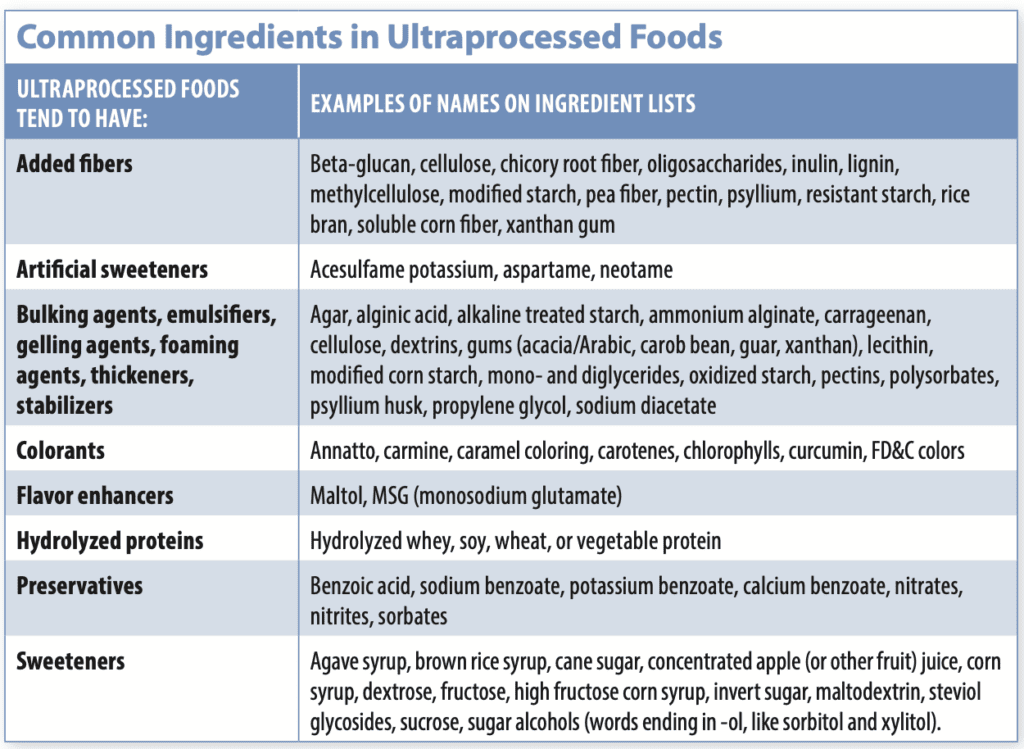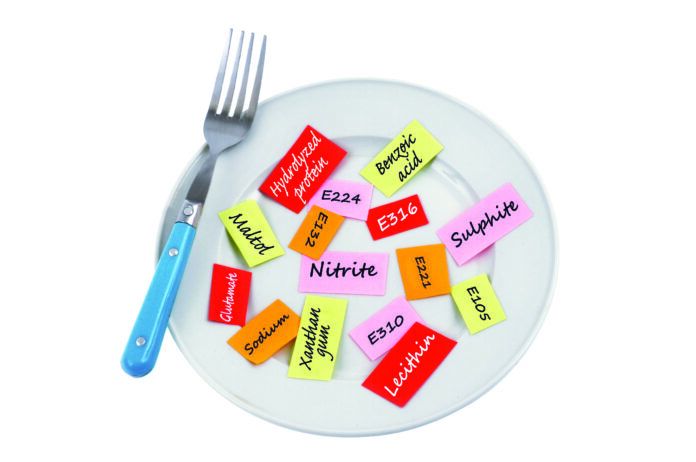The research is clear: a diet high in ultraprocessed foods is associated with higher risk for overweight, obesity, type 2 diabetes, and high blood pressure. These conditions are all risk factors for cardiovascular disease (the leading cause of death worldwide) and they increase risk for other diseases, including cancer, chronic kidney disease, and dementia. Limiting intake of ultraprocessed foods, then, is an excellent choice to maintain long-term health. But how do you know which foods fall into this category?
“Processed.” Processing can extend shelf life, reduce waste, and make foods more convenient. It can also make them safer and improve public health. Before pasteurization, for example, people could get tuberculosis and other diseases from milk. Some forms of processing, like cutting, refrigerating, and freezing, don’t substantially change the nutritional value of foods. So, at what point does the amount of processing make a food less healthy?
“While there isn’t currently one standard definition for the different levels of food processing, we do know the basic characteristics that make some foods worse choices,” says Alice H. Lichtenstein, DSc, senior scientist and director of the Cardiovascular Nutrition Team at the Human Nutrition Research Center on Aging and editor-in-chief of Tufts Health & Nutrition Letter. “They tend to be high in refined starch, added sugar, and salt, and low in healthy components like natural fiber.” In general, ultraprocessed foods bear little resemblance to foods in their natural state. Like a Frankenstein’s monster, parts extracted from nature are combined with man-made compounds to create something new.
Examples of foods that are often ultraprocessed include flavored chips, protein bars, many breakfast cereals, low-fat salad dressings, instant soups, and some commercially-baked cookies and cakes. Here are some things to consider when determining if a food is ultraprocessed:
1. Is it in a box or bag? All ultraprocessed foods are packaged, but not all packaged foods are ultraprocessed (consider a bag of frozen peas, for example, or a box of whole wheat pasta, which have been processed, but not ultraprocessed). Still, this is a good place to start. If you pick up a box or bag from the grocery shelf, take a moment to check for signs the product may be ultraprocessed. Totally unprocessed foods (like whole fruits, vegetables, eggs, meats, poultry, and seafood) do not need a Nutrition Facts label or an ingredient list. Processed foods last for months on a pantry shelf. This trait is good for reducing food waste, but it’s also an indication that a food is highly processed.
2. Is it “flavored” or “instant?” If the front of the package has either of these words, that’s a red flag. You may have to look carefully to find words like “fruit-flavored” hidden below all the pictures of fruit and the healthy-sounding product name. (See Page 1 for more on how to avoid being fooled by marketing tricks.) “Instant” oatmeal, rice, soup cups and other foods increase convenience and are not always a bad choice, but they are not as good as varieties that take a little longer to cook. They cook quickly because their natural cell structure has already been partially broken down. This may cause the carbohydrates to raise your blood sugar more quickly than the unprocessed version. A bigger concern is that quick-cooking foods often have flavorings, sweeteners, salt, preservatives, and other additives that push them into the ultraprocessed category. “An exception would be single ingredient foods,” says Lichtenstein, “such as powdered milk or freeze-dried berries.”
3. Does it have ingredients you don’t recognize? While a long ingredient list is often mentioned as a way to identify ultraprocessed foods, it’s really the ingredients on the list that matter, not the length. “A soup chock full of different vegetables can have a long ingredient list,” says Lichtenstein, “but, if most of these are vegetables and spices, it can be a good choice (unless it’s high in salt).”
Ultraprocessed foods contain added colors and flavors, stabilizers, emulsifiers, anti-foaming agents, hydrolyzed proteins, and other ingredients you are unlikely to find in a home kitchen. (See Common Ingredients in Ultraprocessed Foods for more information.) Some of these are from natural sources, and some are made in a lab, but all are a hint that this food has undergone some serious processing.
4. Is it high in refined carbohydrates? Reasonable portions of carbohydrate-rich foods are not a bad choice, as long as those carbohydrates are in their original form (like the sugars in fruits and milk, and the fiber in grains and produce—see Page 8). But dietary patterns relatively high in added sugars and refined carbohydrates (where the bran and germ have been removed from a grain) are associated with higher risk for heart disease, type 2 diabetes, and other chronic conditions.
In ingredient lists, components are listed by weight, so the higher an ingredient is on the list, the more of it you are getting. If one of the first two ingredients is refined flour (listed as white flour, enriched flour, semolina, durum, or “wheat flour” without the word “whole”), see if you can find a more whole grain—and therefore less processed—version of the product. For example, choose whole wheat bread and pasta instead of white.
Likewise, look out for foods high in added sugars. (Beware! Manufacturers often add multiple sweeteners, which moves each individual sweetener lower on the ingredient list. If “cane sugar” is the third ingredient but “brown rice syrup,” “concentrated fruit juice,” “sucrose,” or any other syrup or word ending in “-ose” is also listed, the total added sugars could actually be the primary ingredient in the food!) Artificial sweeteners are also common in ultraprocessed foods (see Common Ingredients in Ultraprocessed Foods for some artificial sweetener names.)
5. Are the health claims emphasized? It seems contradictory, but the food packages that seems to scream “healthy” the loudest may not be the healthiest choices (see Page 1 or more information). If the package says, “low sugar,” check the ingredient list for non-nutritive sweeteners; if it says it has more fiber than similar products, look for added fibers. (See Common Ingredients in Ultraprocessed Foods for some specific words to look for.) If a food with no fruits or vegetables in it says it’s high in vitamin C, the vitamin C must be added. While less sugar and the presence of non-nutritive sweeteners, added fiber, and added nutrients are not necessarily bad, these factors do suggest the food may not be the very best way to get nutrients. “Even if the Nutrition Facts panel on an ultraprocessed snack food with added vitamins and minerals resembles the nutrient profile of a whole food, that does not make the two foods equivalent,” says Lichtenstein. “The whole or minimally processed food likely contains other trace bioactive nutrients (phytochemicals), types of fiber, and intact food structure the ultraprocessed food lacks.” Some added nutrients may not even be necessary. “Choosing a food enriched in multiple nutrients doesn’t really matter if we already get enough of these nutrients from other foods,” says Lichtenstein.

What to Do. Whether you’re cooking at home, getting takeout, or eating out, try to emphasize minimally processed foods like fruits, vegetables, nuts, seeds, beans, lentils, whole grains, fish, and yogurt. Look at Nutrition Facts labels when buying packaged foods to find the variety with the least added sugar, salt, and refined flour and the most fiber. “Understand and consider what has been done to the foods you eat,” says Lichtenstein. “Focus on your overall dietary pattern. Occasionally eating an ultraprocessed food is not going to have a big impact on your health. The danger comes when ultraprocessed foods replace most of the whole and minimally processed foods you eat or drink.”
➧ Check the Back. If a food comes in a box or bag, look for the Nutrition Facts panel and ingredient list to see what’s in it and compare it to other brands or varieties (or choose another food).
➧ Know Key Words. On the front, “instant” and “flavored” are some key words that hint that a product might be ultraprocessed. Foods with “added” fiber, vitamins, and minerals also deserve a closer look. On the ingredient list, look out for: words you don’t recognize; refined/enriched flour as a main ingredient; and multiple forms of sweeteners.
➧ Keep it Simple. Emphasize whole and minimally processed foods like fruits, vegetables, nuts, seeds, beans, lentils, whole grains, fish, and yogurt in your food choices, and drink mostly water (and unsweetened coffee, tea, and non-alcoholic seltzer).
























